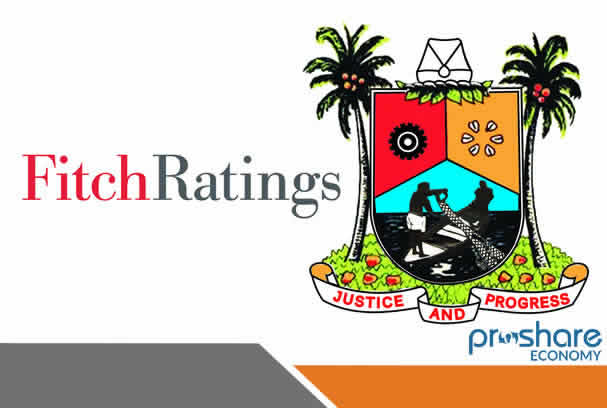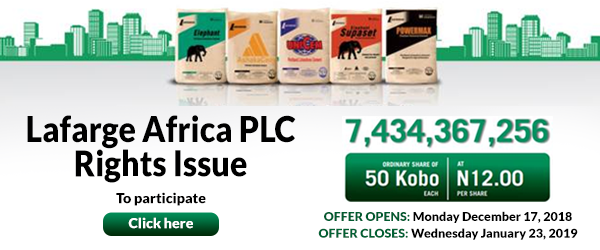Wednesday, December 26, 2018 08:40 PM /Fitch Ratings
Fitch Ratings has affirmed Lagos State's Long-Term Foreign- and Local-Currency Issuer Default Ratings (IDRs) at 'B+' with Stable Outlook and Short-Term Foreign-Currency IDR at 'B'. The National Long-Term Rating has been affirmed at 'AA+(nga)', with a Stable Outlook. The ratings on Lagos's medium-term note (MTN) programme and senior unsecured bonds have also been affirmed at 'B+'/'AA+(nga)'.
The ratings reflect the state's weak socio-economic indicators by international standards against Fitch's expectations of satisfactory operating performance in the medium term, driven by internally generated revenue (IGR). The ratings also reflect adequate transparency compared with national standards and rising but still sustainable debt. The Stable Outlook on the IDRs reflects our view that Lagos will continue to perform in line with our projections.
Key Rating Drivers
Institutional Framework (Weakness/Stable)
A constitutional equalisation system enacted through the Federal Account Allocation Committee (FAAC) pools oil and non-oil revenue collected by the central government and transfers it to local and regional governments. FAAC's funding has proved volatile as Nigeria's federal budget depends on oil for more than a third of its revenue and the severe oil price slowdown from 2012 has resulted in lower transfers to local government entities. For Lagos, IGR contribute far more of its revenue than transfers from the federal government, mitigating exposure to oil price swings and underpinning revenue stability.
The economic development of Nigerian states is dependent on capital projects, which often face challenging budget implementation and are driven by available funding options. Lagos's foreign debt service is supported by irrevocable standing payment orders (ISPO) issued by the federal government to pay bondholders. The amount paid for debt service is then deducted from the states' FAAC share.
Fiscal Performance (Neutral/Stable)
Fitch expects the operating margin to remain stable at around 50% in the medium term, driven by IGR and comfortably covering debt service by 1.5x. Lagos benefits from a diversified revenue structure led by IGR, which represents over 75% of its NGN500 billion total revenue, limiting the reliance on FAAC allocation from the federal government. Fitch projects IGR to grow by 10%-15% in the medium term but it faces downside risk from the large informal economy, which accounts for nearly 40% of local tax-related revenue.
In its rating scenario, Fitch expects operating costs to increase less than the country's double-digit inflation, factoring in a tighter grip on current expenditure and compliance with expenditure targets. Fitch believes that the administration's commitment to investment will boost capex up to NGN1 trillion over 2018-2020, mostly focused on transportation, water, energy and power, including a minimum of 5% dedicated to upgrading health, educational and social facilities.
Debt and Liquidity (Weakness/Stable)
Under Fitch's rating scenario, Lagos's debt will grow over the medium term up to NGN1 trillion or over 170% of tax revenue, driven by new borrowings to finance the demanding NGN 1 trillion capex programme and the negative effect of the naira devaluation on its foreign currency-denominated debt, decreasing from 50% to 40% of total debt in the medium term. Fitch expects long-term debt sustainability to remain compatible with Lagos's rating profile, with an average pay-back (debt-to-operating balance) ratio below five years.
Fitch expects liquidity to remain sufficient to sustain ongoing operations, while the NGN30 billion sinking fund backing up bond issues in domestic currency. The capex programme will be financed by Lagos's IGR proceeds, as well as bank and government facilities, including the NGN 114 billion promissory note to finance infrastructures issued by the central government.
Economy (Weakness/Stable)
Lagos is the main economic hub in Nigeria, accounting for over 20% of national GDP, bolstered by the presence of roughly 90% of companies' headquarters and 60% of industrial investments in the country. However, GDP per capita, at USD4,500, remains weak by international standards. The economy is well-diversified between services, including information and communication technologies, industry and transports. Fitch estimates that Lagos's young and fast growing population of over 20 million inhabitants will drive an increase in social and healthcare expenditure above one quarter of the state's budget in the forthcoming years.
Management and Administration (Neutral/Stable)
Lagos's administration is committed to improving transparency and disclosure, emphasising the availability of financial data and working on the transition from a cash-based to accrual-based accounting, which in Fitch's view is credit positive, as it restricts the scope for discretionary initiatives. Lagos provides a three-year budget and has sophisticated debt management compared with national peers, with repeated access to capital markets.
Rating Sensitivities
A sovereign upgrade could be reflected in Lagos's ratings, provided that improvements in budgetary performance result in debt levels at 1x the budget size. Further improvement of the local economy giving an additional boost to IGR would also be positive for the ratings, provided the sovereign ratings are upgraded.
Lagos's ratings are equalised with the sovereign's. A downgrade of the sovereign's ratings would lead to a corresponding action on Lagos's IDR. In the absence of a sovereign downgrade, a declining operating margin, unfavourable changes in the national tax policy, debt rising beyond Fitch's expectations over the medium term, coupled with economic instability, could lead to a downgrade.
Related News
1. Fitch Affirms Nigeria's Lagos State at ''B ''; Outlook Negative
2. States Generate N579.49bn as IGR in H1 2018 - NBS
3. No Choice for States But to Boost IGR
4. State of State’s GDP: Much Ado About The Maiden State GDP Report?
5. NBS Publishes 11 States Nominal GDP from 2013 to 2017
6. Moody''s: Nigerian States'' Own Revenue Generation is a Key Credit Differentiator
7. State of States 2018 - Lagos Dropped From 2nd to 4th Place on The Fiscal Sustainability Index
 Lagos, NG • GMT +1
Lagos, NG • GMT +1











 5346 views
5346 views







 Sponsored Ad
Sponsored Ad
 Advertise with Us
Advertise with Us









